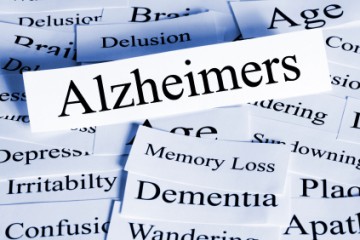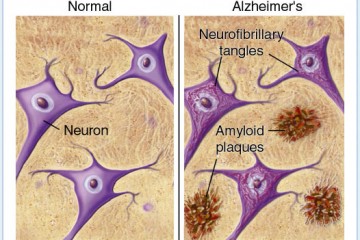Alzheimer’s Disease and Medical Marijuana

Introduction to Alzheimer’s Disease (AD)
Alzheimer’s disease is a neurodegenerative disease caused by the buildup in the brain of extracellular plaques (made of a proteinacious material called amyloid) and intracellular tangles (made up of tau protein). These processes lead to destruction of brain cells and, subsequently, to severe dementia (i.e. “decline in mental ability severe enough to interfere with daily life”) and associated issues.
Patients with Alzheimer’s disease eventually experience memory loss, difficulties in planning, solving problems, and understanding, poor judgment, withdrawal from social interaction, and more. Due to the fact that there is no cure for Alzheimer’s disease, maximization of quality of life improvement measures and supportive treatments are imperative.
Cannabinoid Medicine and Alzheimer’s Disease Treatment
A study published in Molecular and Cellular Neuroscience in September 2013 (reviewed previously on Medical Jane here) provides evidence that plant-based cannabinoids may be effective in reversing the accumulation of amyloid in the brain by assisting in its transport across the blood-brain barrier and out of the brain.
“Plant-based cannabinoids may be effective in reversing the accumulation of amyloid in the brain by assisting in its transport across the blood-brain barrier and out of the brain.”
In a study published in March 2014 in Psychopharmacology and covered previously by Medical Jane here, researchers found that administration of the non-psychoactive cannabinoid cannabidiol (CBD) was able to reverse cognitive decline in APPswe/PS1∆E9 (APPxPS1) transgenic mice (which act as animal models for humans with Alzheimer’s disease).
Other evidence discovered recently by researchers at the Stanford University School of Medicine and published in the journal Neuron in June 2014 suggests that endocannabinoids (which our bodies produce naturally and which stimulate the same receptors as cannabinoids found in whole-plant cannabis), may assist in inhibiting the effects of Aβ amyloid on pyramidal cell conduction (i.e. brain cell communication) and neuroplasticity (i.e. changes in brain cell function, connection, and communication) in the hippocampus (an area of the brain involved in memory formation, organization, and storage). However, due partially to differences in length of effect between endocannabinoids and exogenous cannabinoids (e.g. cannabis use), there was no evidence provided by this particular study to suggest that use of whole-plant/raw plant cannabis is beneficial for Alzheimer’s disease treatment.
Another study published in August 2014 in the Journal of Alzheimer’s disease found that very low doses of delta-9-tetrahydrocannabinol (THC, the psychoactive cannabinoid) were able to reduce amyloid-β aggregation with no observed damage, and were also able to improve the function of mitochondria (the part of cells that produces energy) in vitro (i.e. cells were tested outside of the body). Since the accumulation of amyloid-β in vivo (i.e. within the body, more specifically within the brain, in this case) is the major cause for Alzheimer’s disease progression, preventing such accumulation will likely lead to prevention or slowing of Alzheimer’s disease and its symptoms. According to the researchers, “These sets of data strongly suggest that THC could be a potential therapeutic treatment option for Alzheimer’s disease through multiple functions and pathways.”
“THC could be a potential therapeutic treatment option for Alzheimer’s disease through multiple functions and pathways.”
No large, placebo-controlled, randomized, double-blinded clinical trials have been conducted on the effect of whole-plant cannabis on people meaning that there is no evidence that a cause-effect relationship exists showing that cannabis use improves symptoms or slows progression for patients with Alzheimer’s disease. However, there is mounting evidence that cannabinoids have the potential to work as neuro-protective agents (i.e. those that protect destruction of neurons) through processes such as neutralizing free radicals which cause damage, reducing inflammation, improving function of mitochondria, and clearing away cellular debris, and may therefore prove to be useful for treatment of Alzheimer’s disease via various mechanisms. Increased research will help us to explore and harness any potential neuroprotective effects of cannabinoids. Please click here for more information on the potential for cannabinoid medicine use in the treatment of neurodegenerative diseases.
Alzheimer’s Disease Symptom Relief
Cannabis use may be helpful in treating symptoms often experienced by patients with Alzheimer’s Disease, such as sleep disturbance or psychological symptoms such as depression and anxiety. It may also provide relief to patients experiencing nausea, vomiting, and loss of appetite, which are potential side effects of certain standard Alzheimer’s disease medications.
Endocannabinoid System Findings
The chart below is a summary of information available on the endocannabinoid system in patients with Alzheimer’s disease from the review “The influence of cannabinoids on generic traits of neurodegeneration”, Fagan & Campbell, 2014. Note: “CB1″ and “CB2″ receptors are those to which cannabinoids bind and thereby exert their effects, “DGL” is diacylglycerol lipase (an enzyme involved in the formation of 2AG, an endocannabinoid, a cannabinoid found naturally in the body), the “cortex” is the outermost layer of neuronal brain tissue, “AEA” is anandamide (an endocannabinoid), FAAH is an enzyme that acts to increase levels of AEA, increased levels of endocannabinoids may signal a decrease in number or quality of endocannabinoid receptors
Conclusion and Warning
Given the highly favorable safety profile of whole-plant cannabis, whole-plant cannabis medicine may be a safe and useful additional therapy for patients with Alzheimer’s disease who are finding it difficult to manage certain symptoms treated or side effects caused by standard therapies. However, due to the current lack of research evaluating/anecdotal evidence corroborating the benefits of whole-plant cannabis on patients with Alzheimer’s disease, and to the potential for psychoactive strains to cause and exacerbate paranoia, psychological discomfort, and short term memory loss during intoxication (which are symptoms already experienced by patients in certain stages of Alzheimer’s disease), the use of whole-plant cannabis with higher levels of THC may not be an optimal treatment option for many patients. Contemplation of use should be carefully considered with the guidance of a healthcare professional, and if the decision in support of cannabis treatment is made, treatment should be started slowly, constantly and closely monitored by a healthcare professional, and discontinued at the first sign of patient discomfort.
Increased research on cannabinoid medicine and modulation of the endocannabinoid system in relation to Alzheimer’s disease and other neurodegenerative diseases has the potential to not only lead to symptom management for patients, but also potentially to novel therapies which may help to prevent progression, and potentially initiation, of the disease.
For more information on what to expect when considering whole-plant medical cannabis use, click here.
Source: MedicalJane.com





No Comment